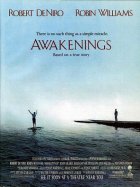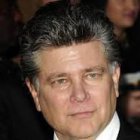
Awakenings
- PG-13
- Year:
- 1990
- 121 min
- 2,367 Views
1. A dusty deserted street -saloon, livery stable, sunset.
Only there is something unsettling about it all. The colors
are too muted and the angles not quite in perspective. Pulling
slowly back eventually reveals the edges of a narrow wooden
picture frame ...
INT. BEDROOM -NIGHT -1930
Drifting away from the painting and slowly across a room.
Across Venetian blinds, open, letting in moonlight, across
intricate handmade wooden models, dime novels and comic books,
across the arm of a metronome gently slapping back and forth,
and settling finally on a small hand writing slowly and
deliberately, over and over, in synchronization, it seems, to
the rhythm of the metronome, the word, " L E O N A R D . "
2. INT. DINING ROOM -MORNING -1930
The pendulum of a clock. An adult hand placing a bowl of
cereal on a table. Leonard, ten or eleven, waits a moment for
the adult to leave, grasps his spoon, and manipulates it from
bowl to mouth in time with the soft regular rhythm of the
clock.
3. EXT. STREET -NEW YORK -MORNING -1930 3.
Schoolbooks slung over their shoulders, Leonard and another boy
his age, a classmate, move along a street.
All around them are "visual rhythms" -lines in the sidewalk,
the even placement of trees, the sunlight breaking through the
branches above them -and somewhere unseen, the rhythmic
pounding of an elevator train.
As they climb a fence, a pocket watch, Leonard's, falls to the
ground.
4. INT. CLASSROOM -DAY -1930 4.
An adult hand chalking the words of a poem on a blackboard.
Children at desks dutifully transcribing the lesson.
All but one. Leonard. Whose hands are trembling slightly and
whose paper is blank. There is a noticeable lack of rhythms.
A cold silence. The broken watch rests on his desk.
The boy from the train, glancing at Leonard, begins gently
tapping the end of his pen against his desk. Leonard, "guided"
by the cadence of his friend's tapping, begins to write.
(o
(oo
The teacher's hand at the blackboard hesitates. Distracted by 4.
the rhythmic noise, he traces it to the offender and silences
him with a look.
\ '
Without the rhythm, and without, apparently, inner natural
rhythms to replace it, Leonard's hand begins dragging the pen
across the paper, forming vague scrawl, each word less defined
than the last, until they begin melding together into what
resembles nothing so much as a child's rendering of ocean
waves.
The teacher resumes chalking on the board. The boy from the
train begins tapping his pen again, and, "guided" again by the
rhythm, Leonard is able to give definition to the "ocean
waves," to form recognizable letters.and words.
The teacher hesitates again and glares at the boy making the
irritating noise. The boy stops tapping and Leonard's writing
again becomes formless.
5. INT. CLASSROOM.-LATER -DAY -1930 5.
The finished poem on the blackboard. The sounds of children at
play on the schoolyard. The teacher, alone in the classroom,
at his desk grading the penmanship lesson.
o
He circles offending errors on the last page of the last
composition book. He scribbles a grade opposite the student's
name in a grade book. He notices the absence of a grade in
Leonard's column. .
Leonard's desk. The teacher locates the missing composition
book buried under textbooks. He takes it back to his own desk,
opens it, and stares curiously at the last lesson, the poem, or
rather Leonard's illegible representation of it.
He considers earlier lessons in the book. He begins to see in
the script a pattern of deterioration. He reaches the last
entry again and stares at the few recognizable words drowning
In "the waves."
SAYER:
It was an immense project. "
I was trying to extract a decigram
of myelin from four tons of
earthworms.
REV.12/15/89 (GREEN) Pg.5
7.C0NT. DIRECTOR 7.
(pause)
Really.
SAYER:
I was on it for five years.
I was the only one who really
believed in it. The rest of them
said it couldn't be done. t
KAUFMAN:
It can't.
SAYER:
Well, I know that now. I proved
it.
The director offers a slow tentative nod before consulting the
resume again.
DIRECTOR:
Maybe before. At Saint Thomas.
(Sayer is already
shaking his head no)
All research. Earth -?
SAYER:
Pigsbrains ... they•requite
similar to human brains.
DIRECTOR:
(hopefully)
Are they?
SAYER:
Oh,yes ... threeyears.
As the Director retreats back to the resume, hoping against
hope of finding in it something germane, Sayer glances away to
a window. He wishes he were outside it. He has no business
being here. He should leave.
SAYER:
Excuse me, I made a mistake coming
here. Clearly you're looking for
someone with more of a clinical
background.
He stands up to leave. Kaufman stands to see him out. But the *
director keeps searching the resume.
Q:
REV.12/15/89 (GREEN) Pg.6
7.C0NT. SAYER . 7.
I've taken enough of your time.
You must have a hundred applicants
more suitable.
KAUFMAN:
Thanks anyway.
DIRECTOR:
Back in medical school ...
Kaufman shoots the Director a look that says, No, we're not
that desperate.
DIRECTOR:
I mean, you couldn't have
graduated without some clinical
experience. .
Sayer hesitates. And eventually manages sort of a shrug and a
nod., v'
DIRECTOR:
Well, there we are, doctor.
Kaufman can't believe it, but is sent back a look that says,
We have no choice. The Director gets up out of his chair, and,
smiling broadly, extends his hand to Sayer. Which unsettles
Sayer. Which in turn unsettles the Director.
DIRECTOR:
(not far from v
begging)
You do want the job, don't you?
Sayerisn'tsosure. Hethinksaboutitlongandhard. ..
8. INT. CORRIDOR -BAINBRIDGE -DAY 8.
Moving along a corridor crowded "with patients, some ambulatory,
some in wheelchairs, "living people" living with profound
neurological disease.
ANTHONY O.S.
Spent much time in chronic
hospitals, doctor?
A patient approaches, and, passing Sayer and the orderly who's
escorting him (ANTHONY), offers
FEMALE PATIENT 1
Hello. Hello. Hello. Hello...
REV.12/15/89 (GREEN) pg.7
8.C0NT. ANTHONY 8.
(to Sayer)
You'd remember.
SAYER:
I guess not.
As they pass an old patient in a wheelchair
ANTHONY:
Hey, how you doing?
(calling to someone
down the hall)
Dr. Sullivan.
Staying on the old patient, he eventually manages, too late
OLD PATIENT:
Fine...
Down the hall in an alcove, Dr. Sullivan glances up long
sufferingly from-a.patient~with'.an .Ouij a-board who !.s mumbling, *
complaining, unintelligibly. Anthony and Sayer arrrive.
ANTHONY:
Dr. Sullivan, this is Dr. Sayer;
'':
:' ' -'.There's a kind a "deadness" in Sullivan's eyes and voice; he's
been here too long.
SULLIVAN:
Not the neurologist, that'd be
asking too much. You're not the
neurologist.
SAYER:
I think I am.
Translation
Translate and read this script in other languages:
Select another language:
- - Select -
- 简体中文 (Chinese - Simplified)
- 繁體中文 (Chinese - Traditional)
- Español (Spanish)
- Esperanto (Esperanto)
- 日本語 (Japanese)
- Português (Portuguese)
- Deutsch (German)
- العربية (Arabic)
- Français (French)
- Русский (Russian)
- ಕನ್ನಡ (Kannada)
- 한국어 (Korean)
- עברית (Hebrew)
- Gaeilge (Irish)
- Українська (Ukrainian)
- اردو (Urdu)
- Magyar (Hungarian)
- मानक हिन्दी (Hindi)
- Indonesia (Indonesian)
- Italiano (Italian)
- தமிழ் (Tamil)
- Türkçe (Turkish)
- తెలుగు (Telugu)
- ภาษาไทย (Thai)
- Tiếng Việt (Vietnamese)
- Čeština (Czech)
- Polski (Polish)
- Bahasa Indonesia (Indonesian)
- Românește (Romanian)
- Nederlands (Dutch)
- Ελληνικά (Greek)
- Latinum (Latin)
- Svenska (Swedish)
- Dansk (Danish)
- Suomi (Finnish)
- فارسی (Persian)
- ייִדיש (Yiddish)
- հայերեն (Armenian)
- Norsk (Norwegian)
- English (English)
Citation
Use the citation below to add this screenplay to your bibliography:
Style:MLAChicagoAPA
"Awakenings" Scripts.com. STANDS4 LLC, 2025. Web. 3 Mar. 2025. <https://www.scripts.com/script/awakenings_996>.







Discuss this script with the community:
Report Comment
We're doing our best to make sure our content is useful, accurate and safe.
If by any chance you spot an inappropriate comment while navigating through our website please use this form to let us know, and we'll take care of it shortly.
Attachment
You need to be logged in to favorite.
Log In